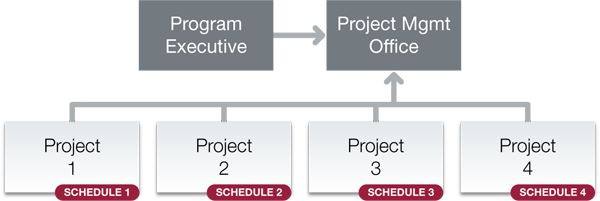A project team struggling to manage their work may look to scheduling tools, standardized training or governance cadences to get a project back on track. Historically used by an organization to prevent scheduling quality issues, these methods are often expensive and fail to address the challenges that impact project delivery performance. How can organizations address these challenges? By setting up a scheduling service within your organization’s project management office (PMO).
What is a PMO?
A project management office (PMO) is an agency or department that works to standardize project management processes and methods to create consistency and improve the chance of project success. The PMO maintains and creates documentation governance, creates best practice and tracks and monitors metrics, to ensure that projects are delivered on time and within budget. The PMO is typically made up of professionals across and organization, including IT, finance, operations and risk management.
Why is scheduling important in project management?
The schedule is at the heart of performance for each and every project. Developed appropriately, it gives the project manager and stakeholders a roadmap for operationalizing or implementing the strategic initiatives of the organization.
Project scheduling comes with challenges
Developing a project plan that provides useful information about time, cost, resource capacity, and scope can be a tedious task with many dependencies. Multiply the complexity of a single project across a program or portfolio, and the opportunity to experience schedule quality issues increases dramatically.
Since these schedules are tied to the delivery of overarching strategic initiatives for the organization, each schedule quality issue affects the ability of the organization to operationalize or implement its strategy efficiently. According to Project Management Institute’s 2017 “Pulse of the Profession,” organizations are wasting $97 million for every $1 billion invested due to poor project performance. Yes, that’s a 20% decline from the previous year’s survey; but the truth is, projects still fail at a staggering rate.
Top signs of schedule quality issues
- Inability to support analysis of project status related to “what if” project changes
- Scheduling principles that are not well understood or inconsistently applied by end users
- Poor data quality, resulting in the inability to create a program or portfolio view that can enable proactive decision making
- Resources spending too much time correcting schedules and chasing stakeholders for additional data
- Inability to effectively implement Project Portfolio Management (PPM) principles that optimize return on investment by sequencing timeline, budget, and resources
Outdated methods of preventing schedule quality issues
Historically, organizations have used a variety of approaches to try to mitigate poor project performance and schedule quality issues. Some of those approaches include:
- Use of a scheduling tool
- Standardized training of resources who manage the schedule
- Robust governance cadences
While each of these approaches may provide some benefit, the administrative burden on critical project resources is high and expensive and often still results in common challenges related directly to schedule quality. These issues can be alleviated, however, if you ditch the outdated methods and opt to set up your scheduling service within the PMO.
Prevent schedule quality issues by creating a scheduling service within the PMO
Creating a scheduling service within the PMO can minimize the symptoms listed above. Whereas the prior responsibility for scheduling rested with a resource across each individual project, by centralizing scheduling as a service within the PMO, project managers and resources are freed up to focus solely on the delivery of the project.
Figure 1: Organization without a Scheduling Service
Figure 2: Organization with a PMO Scheduling Service
How does setting up a schedule within the PMO work?
A reporting structure for a PMO that has a centralized scheduling service consists of a scheduler who reports directly to the PMO executive while supporting multiple project managers. While the project manager remains responsible for schedule content (e.g., milestones, tasks, etc.), the scheduler is responsible for maintaining schedule integrity, advising on schedule recovery, and providing guidance related to dependencies across the portfolio.
Once the quality of the data contained within the schedule is improved, the often-confusing mix of interrelated and dependent projects can be managed. This enables the scheduler to advise and implement effective project portfolio management (PPM) that will calculate the optimal prioritization and sequencing of all projects to maximize the return on investment.
Additional benefits of a scheduling service within the PMO include:
- Reduced tool licensing and training costs
- A single source for executives to understand their portfolio’s status
- Increased ability to make proactive portfolio decisions based on high-quality data
- Reduced time to realize return on project management resources as a result of less training time
- The ability to resolve cross-plan dependencies for resource loading and reconciliation
- Earlier identification of slippage and missed targets
- Reduced cost and effort to increase organizational project management maturity
Finally, including a scheduling service within the PMO results in schedules that are understood more easily and actionable by end users. This creates a value-add offering within the PMO that can drive otherwise reluctant end users to seek out the services that PMO offers while still in the early planning stages of their projects and programs.
Creating a scheduling service within the PMO is only one way that this group can add to the organization. Over time, the PMO can emerge as a valuable partner, maturing the level of project management capabilities and quality deliverables across the organization, resulting in improved efficiency, cost saving and strategic success.







